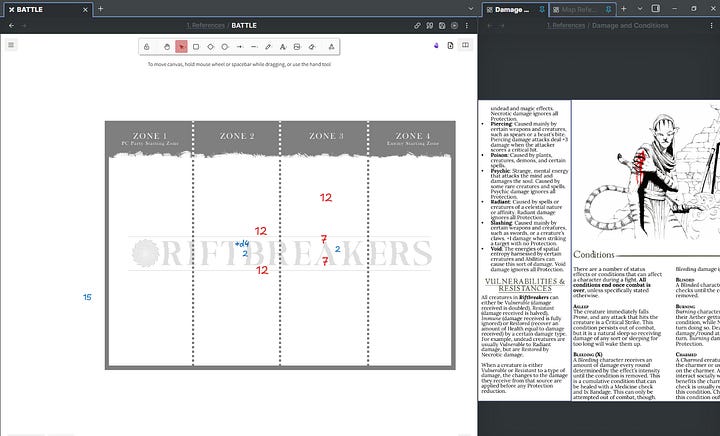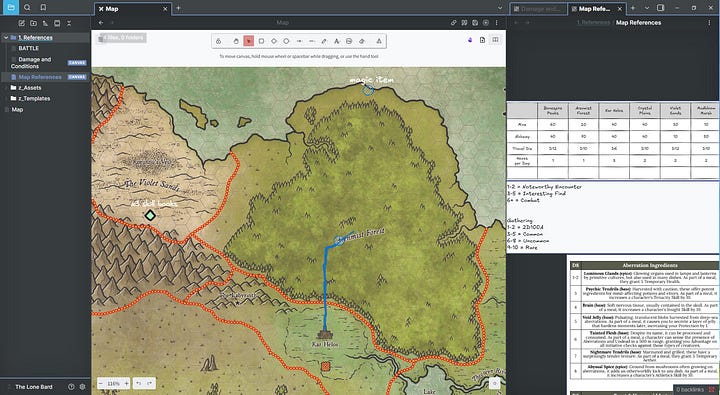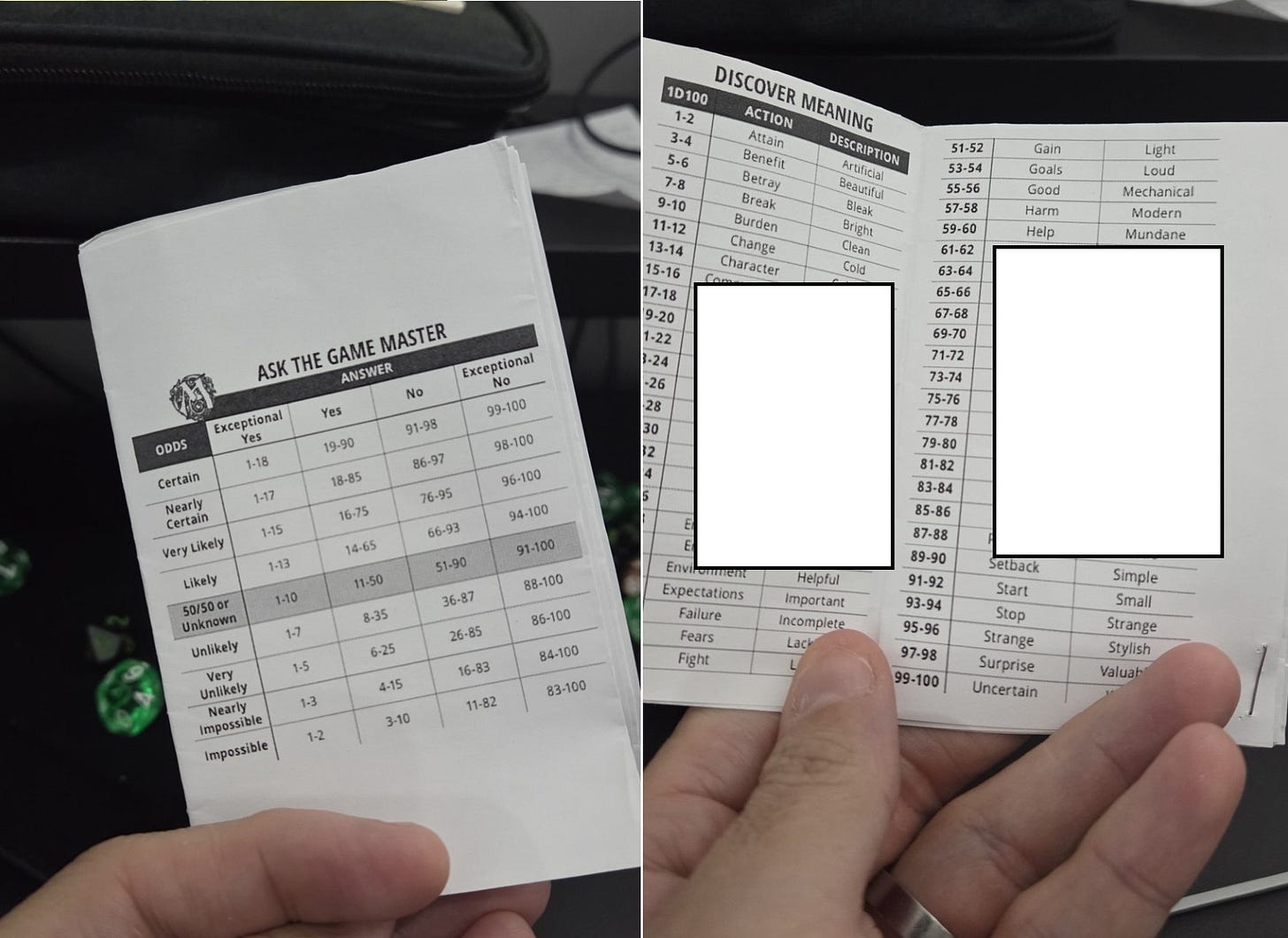Unfolding the machines: giving complex tools a second chance in solo gaming
How pushing past the initial barrier of learning something new led me to my currently favorite tools: Obsidian and the Plot/Game/Scene Unfolding Machines GME.
I’m highly resistant to introducing new tools in my solo gaming setup. That goes from pdfs to new technology wonders like Obsidian.
However, breaking that initial resistance led me to find my currently favorite GME: the Plot, Game, and Scene Unfolding Machines (PUM/GUM/SUM), created by Jeansen Vaars.
The first time I used them, I found the books extremely convoluted. I was already comfortable with my One Page Mythic + One Page Solo Engine/Ultimate RPG Solo Toolkit setup. The UM trio looked clunky and intimidating for a newcomer, so I put it aside.
Last week I gave it a proper run to decide if I should bin it forever. No point in hoarding tools I’ll never use. I’m really happy I did that.
The UM books have more concrete generators than Mythic’s word combination rolls. That posed a problem for me at first. I actually like Mythic’s open-endedness because it lets me steer the game to my own liking and imagination. The UM tables and prompts require a slightly different approach, as they will funnel your outcomes somewhat.
I got used to it and had a great session of Riftbreakers 2e with them. Past the initial hurdle, the game flowed smoothly. And that, for me, was one of the problems with the UMs: the entry barrier. It greets you with a wall in the form of charts and introductions, and also due to having 3 books. You could use just PUM, but you would be missing out a lot, especially the incredible action/adjective/subject nouns in GUM.
The other problem for me was knowing when to use what. That’s kind of tied to the initial learning curve. Since there are a lot of tables and generators in the books, my session can stall at several points in search of the proper oracle. Should I roll a scene emulation, a couple of random words, a descriptive oracle, or get a simple yes/no answer based on the current context?
That gets better with time, of course. It’s even faster and easier if you’re an experienced solo player.
I’ve also been dabbling with Obsidian and I’m finding it extremely convenient for solo play. I use a dead simple setup and I’m loving how it facilitates referencing stuff.


I’m not dumping analog play anytime soon. I love rolling real dice and writing on paper. However, 99% of my RPG library is on a SSD. Digital tools won’t substitute my pens, notebooks, and dice, but they’re complementing them wonderfully.
Back to the UMs, I’ll share a summary of the session I mentioned. Unfortunately I didn’t write it all down as I wasn’t intending of sharing any of it, so I don’t have the exact rolls and tables I used, but here’s the gist of it.
I went to explore an abandoned ancient fortress in a hex. Getting to the hex, I rolled for encounters and got: A band of traveling minstrels, who know many a strange and untold tale. I thought this was the perfect opportunity to test the UMs.
I started rolling for an adventure hook and asked if it was related to the ancient fortress, getting a yes. I really regret not writing it down, but I used a combination of various tables and generated this: The minstrels tell me of a legendary monster in the fortress and ask me to kill it. They’re wandering Kaethor trying to write a song of a powerful warrior defeating a worthy foe. They know the traps and ambushes inside and will guide me through the place. The song will be dedicated to me and will spread the fame of my exploits (the reward is +2 Reputation with the Adventurers Guild).
An honesty check from SUM tells me they’re lying about something. I rolled a Perception check (game’s mechanic) and failed, so I was just cautious with them, not fully trusting them for some reason.
I used the UMs to generate the fortress areas as I moved through them, kind of like a dungeon crawl.
The fortress is an area used by a group or faction trying to expand or dominate the area through diplomacy (faction generator tables from GUM). I don’t know what faction that is.
The entrance is completely barricaded. The minstrels show me a way around and we enter.
I won’t go into detail on all the areas. I used a UD6 and rolled until I got a 1 or 2 in a D4, getting the final area. In short: the place had been abandoned, most if not all resources and valuables had been removed, and entrances and exits had been sealed shut.
In one area, I find someone who’s not exactly a person. It’s the spirit of a man. He wants to help me, to warn me of something. The minstrels can’t see or hear him, for some reason.
The spirit tells me the minstrels have been lying to me. I rolled a plot hook for his story using GUM: he sacrificed himself to trap the minstrels in the fortress and block the place so no one could enter. Only the minstrels know how.
I rolled on generators from PUM and GUM to flesh out the minstrels. They’re actually Riftspawn who manifest the minstrel form with their remnant powers to seek help. They want me to kill the spirit’s physical form, convincing me that it’s a legendary monster, to free them. This is what the ‘conquer or expand through diplomacy’ means.
The spirit told me to go a different way. I change directions. The minstrels tried to convince me to stop, to follow their instructions, but I pressed on.
I get to the last room. There’s actually a Rift inside! They didn’t want me to see it because they know I’m a Stranger and would relate it to the Adventurers Guild (I was actually on a patrol quest, identifying Rifts around the map, so this fit beautifully). I run away from the place as quickly as I can.
The minstrels vanish, and they start using their powers to cast illusions inside. I get lost and fall into traps, but eventually make my way out and to the city. I report what happened to the Guild and I gain a Reputation point.
And that’s basically it. Nothing groundbreaking, but a damn fun adventure for me.
The point of all this is, complex tools might not be that complex after all, and a little time investment can have incredible payoffs in the long run.
I’d love to know if you’ve ever had this experience with any RPG tool, from resistance to interest to ‘hey, this is actually great!’
Thanks for reading!




I hit the same wall when I looked into the UMs. Same with FlexTale, I could not figure out how to use them.
I’ve been so tempted to get the whole set, along with the app the writer built to support gameplay, but I’m also afraid it’ll be overwhelming since I can barely stomach Mythic 2e. Your post has been helpful — I’ll hold off getting it until I feel like I need to venture further with solo play.